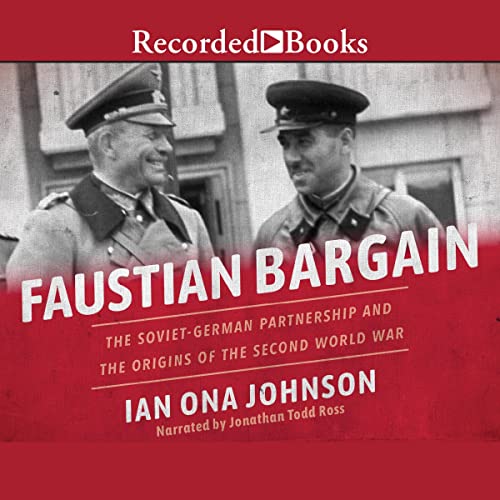
Faustian Bargain
The Soviet-German Partnership and the Origins of the Second World War
Artikel konnten nicht hinzugefügt werden
Der Titel konnte nicht zum Warenkorb hinzugefügt werden.
Der Titel konnte nicht zum Merkzettel hinzugefügt werden.
„Von Wunschzettel entfernen“ fehlgeschlagen.
„Podcast folgen“ fehlgeschlagen
„Podcast nicht mehr folgen“ fehlgeschlagen
Für 31,95 € kaufen
Sie haben kein Standardzahlungsmittel hinterlegt
Es tut uns leid, das von Ihnen gewählte Produkt kann leider nicht mit dem gewählten Zahlungsmittel bestellt werden.
-
Gesprochen von:
-
Jonathan Todd Ross
-
Von:
-
Ian Ona Johnson
Über diesen Titel
When Nazi Germany invaded Poland on September 1, 1939, launching World War Two, its military might was literally overwhelming. The Luftwaffe bombed towns and cities across the country; 50 divisions of the Wehrmacht crossed the border. Yet only two decades earlier, at the end of World War One, Germany had been an utterly and abjectly defeated military power. Foreign troops occupied its industrial heartland, and the Treaty of Versailles had reduced its vaunted army to a fraction of its size, banning it from developing new military technologies. When Hitler came to power in 1933, these strictures were still in effect. By 1939, however, he had at his disposal a fighting force of 4.2 million men, armed with the most advanced weapons in the world. How could this seemingly miraculous turnaround have happened?
As Ian Ona Johnson establishes beyond question in Faustian Bargain, the answer lies in Soviet Russia. Beginning in the years immediately after the First World War and continuing for more than a decade, the German military and the Soviet Union, despite having been bitter enemies, entered into a partnership designed to overturn the order in Europe. Centering on economic and military cooperation, the arrangement led to the establishment of a network of military bases and industrial facilities on Soviet soil, away from the oversight established by Versailles. Through their alliance, which continued for more than a decade, Germany gained the space to rebuild its army. In return, the Soviet Union received vital military, technological, and economic assistance. Both became military powers capable of mass destruction - one that was eventually directed against the other. Drawing from archives in five countries, including new collections of declassified Russian documents, Faustian Bargain offers the most authoritative exploration to date of this secret pact and its cataclysmic results.
©2021 Ian Ona Johnson (P)2021 Recorded BooksDas sagen andere Hörer zu Faustian Bargain
Nur Nutzer, die den Titel gehört haben, können Rezensionen abgeben.Rezensionen - mit Klick auf einen der beiden Reiter können Sie die Quelle der Rezensionen bestimmen.
-
Gesamt5 out of 5 stars
-
Sprecher5 out of 5 stars
-
Geschichte5 out of 5 stars
- bimbamdoria
- 01.08.2023
Insightful
This book together wit Timothy Snyder's Bloodlands ought to be on the curriculum for every German pupil before they finish school. Unfortunately the close cooperation between (Nazi)Germany and Stalin is mostly forgotten, especially Stalin's willingness to provide support for Hitler's war efforts not only in Europe but also in the Pacific. Another book confirming the Horseshoe-theory about fascism and socialism.
Ein Fehler ist aufgetreten. Bitte versuche es in ein paar Minuten noch einmal.
Sie haben diese Rezension bewertet.
Wir haben Ihre Meldung erhalten und werden die Rezension prüfen.



